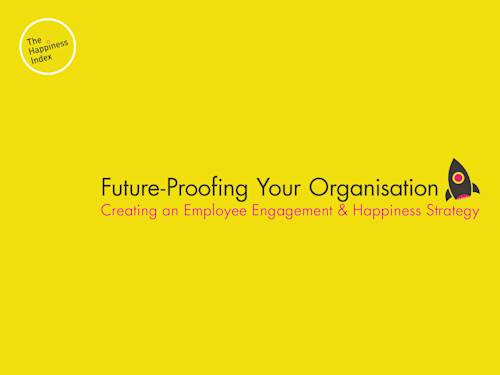
Creating an Employee Engagement AND Happiness Strategy
How do organisations support their employees? How do they work with suppliers? How do they interact with the communities they operate in? The answers to these questions form the 'S' in ESG. And social factors are gaining ground in the corporate world.
We’ve all heard of ESG, right? Now it’s commonplace to discuss in the boardroom… but not so long ago ESG used to be a niche interest of organisations. Financials and metrics meant sales and savings, not environmental, social and governance issues.
Twenty years ago the UN first coined the terms environmental, social and governance factors. Now ESG goals in organisations have gone mainstream. Globally, they form a third of total assets. By 2025 they are likely to be worth a whopping $50trillion.
Over 80% of UK organisations have an ESG offering… the other 20% of you need to pull your socks up! ;) Their strategies and investments aspire to safeguard the environment (Environmental). They look after employees, suppliers, customers and surrounding communities (Social). Internal procedures are as clear as day and changed when needed (Governance).
But are organisations putting their money where their mouths are? Only half of employees believe that their organisation effectively protects the environment. And people vote with their feet. More than three quarters say they will stop buying from organisations that don’t care for the environment, employees or the community. And a massive 81% of students scrutinise environmental credentials when applying for jobs. So if you want to widen your talent pool when recruiting, an ESG policy isn’t a bad place to start…
But it’s not just about money. If ESG factors are crucial to organisations now, they will be indispensable to them in the future. By 2025, failure to report on ESG initiatives will likely be unlawful!
Not developing an ESG strategy is not an option. In certain sectors, under-investing in ESG can cost up to 50-60% of an organisation’s EBITDA (Earnings Before Interest, Taxes, Depreciation and Amortisation). If you want prosperity for your business, you need ESG goals.
Forward-thinking businesses reach for carbon efficiency. They pay their employees fairly and equally. They champion and support whistle blowers. And with good reason. Greater growth - tick! Greater profitability - tick! Positive impact on the top line - tick! But it’s not just about making money. Governments are rightly determined to combat climate change and nurture diverse, equitable and inclusive societies. How will they do this? Regulations of course. ESG programmes can save as much as 60% of what you spend on raw materials and widen your pool of investors. A colossal 77% of potential investors are likely to consider investing ethically.
Why? Ethical organisations are less likely to make expensive missteps, take unnecessary risks or even engage in financial fraud. Don’t shut those investors out!
We’ve heard it before, but that doesn’t stop it being true. People are your biggest asset. And behind an ESG strategy is your people. The 'S' in ESG simply means how an organisation treats employees, suppliers and the communities around it.
Many parts of ‘the S’ are not new. We’ve thought about the health, safety and wellbeing of employees for decades. We know we should pay employees fairly and offer inclusive benefits. We appreciate that we must hold employee data confidentially and within legal parameters. We realise that a diverse and skilled workforce is essential.
Gone are the days of not knowing where products come from or how they are made. Now, we’re starting to grasp that we have some responsibility for the organisations we work with. How sustainable is our supply chain? Do our suppliers treat their people fairly and pay them a good wage? Are suppliers working within anti-bribery and corruption laws?
We all operate within a broader, diverse society. And we must all nurture relationships within it. Engaging with communities. Understanding communities’ needs and desires. Giving something back. Never mind chasing profit. These are the moves organisations should be making.
But focusing on the 'S' in ESG won’t harm your profits. Diverse management teams deliver 19% higher revenues from innovation. Diverse hiring, employment and inclusion mean 28% higher revenues and 30% higher profit margins - And future workforces will flock to you! Almost three quarters of employees aged 34 and younger say they want to work at organisations that match their personal values!
When we think about the last three years, it’s not surprising the spotlight is now on the 'S' in ESG. The Covid-19 pandemic forced us to live and work differently. We saw economic and social issues that we might not have known about. Perhaps we felt isolated working from home and our mental health suffered. We might have become suddenly and acutely aware of deep-rooted inequalities in society.
Now, thank goodness, we’re listening to more people and understanding that different people bring different things to work. We are getting to grips with what diversity, equity and inclusion actually looks like. Working to live and living to work are phrases no longer fit for purpose. Employees have meaning in their lives within work and outside work. We’re pack animals with mammalian brains. We need relationships with others.
Positive and meaningful relationships within organisations and outside them in communities are fundamental to happiness. And with that happiness comes meaning and purpose. To paraphrase Spiderman, with great meaning and purpose at work comes great commitment to organisational values and engagement!
And yet……the ‘S’ in ESG is hard for companies to define. Organisations can measure their environmental impact. They can deploy tools that show they’re accountable. But the social is internal and external. Policies and procedures. Products and services. Employees and suppliers. Customers and the community. In short, the social affects everything that an organisation does.
And it is chock-full of evolving concepts. Standards and frameworks transform rapidly. Diversity and inclusion means different things in different industries and sectors. Global supply chains and communities shift and change.
This is where HR comes in. The heroes in HR recruit. They retain. They engage the best talent. But that’s not all. They set the stage for a culture that encourages communication, fulfilment and strong relationships. They have the power to make or break an employee’s experience of an organisation. And it is the employee - as the face of an organisation - who can make or break the relationships with suppliers, customers and the community.
Our Environmental, Social and Governance survey gives organisations an understanding of how their people believe they are working towards goals beyond maximising profits. If your people don’t understand what you are doing, or aren’t buying into your ESG efforts, you’ll be losing out on all of the benefits it can bring.

Linked to Happiness & Engagement in our neuroscience methodology... learn more
The Happiness Index helps organisations measure the key employee engagement AND happiness drivers to power their people strategy.
Our unique platform offers the products, insights and tools to shine a light on your cultural health and empower management to drive thriving cultures.
Our neuroscience-based pre-built surveys measure the full employee experience - from onboarding to exit to empower and enable organisations to understand their people and create data-led action plans.
